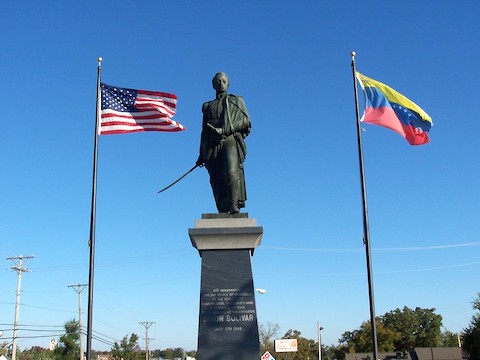
02 Oct ‘Our Lives Are Not Temporary’: Venezuelans Wary as Clock Ticks on TPS Protections

A statue of Simón Bolívar stands between the U.S. and Venezuelan flags in his namesake Bolivar, Missouri, in 2007. (“Statue to Simon Bolivar”, J. Stephen Conn / Flickr / CC BY-NC 2.0 license)
By Roxsy Lin, American Community Media
When Yoselyn Barboza returned home to Venezuela in 2016 after an international trip, she found her young son gravely ill. Doctors quickly diagnosed him with amoebiasis, a common infection easily cured with antibiotics — at least in most places.
But medicine was in short supply then in Venezuela, so the pediatrician urged Barboza to look outside the country, in neighboring Colombia.
While relatives managed to secure the needed medicine in time to treat the boy, the experience left Barboza shaken. “Deep down, I had this fear that my son could have died,” she recalled, “and that I wouldn’t have been able to do anything about it.”
That’s when Barboza decided to leave Venezuela for the U.S.
‘We have never had permanent status’
Since 2014, more than 7.7 million Venezuelans — about 20% of the nation’s population — have fled the country, which has been devastated by chronic food and medicine shortages, collapsing public services, and political persecution.
Roughly 770,000 Venezuelans now live in the U.S., where over 600,000 have secured Temporary Protected Status, a federal program that shields individuals present in the U.S. from deportation when conditions in their home country are deemed too dangerous to return.
The Secretary of Homeland Security determines which countries qualify for TPS, granting protections that last 6, 12, or 18 months. Beneficiaries must re-register to maintain their protection, which includes work permits and travel authorization. TPS does not provide a path to permanent residency or citizenship.
In January, the Trump Administration announced that it was terminating TPS designations for Venezuelans, reversing Biden-era extensions.
“I have been living in the United States for 27 years and have had TPS since 2001, when TPS was granted to Salvadorans,” said Jose Palma, co-coordinator of the National TPS Alliance, an advocacy group formed and led by TPS beneficiaries nationwide. The group is the lead plaintiff in a case challenging the termination of TPS status for Venezuelans and Haitians.
Speaking in Spanish, he added, “We have never had permanent status. We have always been living life from one year and a half to another year and a half. We need a permanent solution because our lives are not temporary.”
Once a TPS designation ends, recipients return to the immigration status they held before TPS — meaning those who were undocumented, for example, become eligible for removal again.
Earlier this summer, the Department of Homeland Security announced it was ending TPS protections for citizens of Nepal, giving them just 60 days to leave the country. Many had resided in the U.S. for more than a decade. The case is currently being litigated, but it demonstrates the precarious situation many TPS recipients here face.
‘What if they take me’
On Sept. 5, shortly before Venezuelan’s TPS protections were set to end, federal judge Edward Chen of the Northern District of California ruled against the Trump administration, restoring the TPS designation, at least temporarily. One week later, however, on Sept. 11, Chen’s ruling had yet to be updated on the USCIS website.
According to the National TPS Alliance, individuals were being laid off from their jobs because of the outdated information. Others said they were blocked from re-registering because Venezuela had not been put back on the list of eligible countries.
The Trump administration, meanwhile, appealed Chen’s ruling to the Supreme Court. A final decision on the case is still pending.
The back and forth has left many TPS beneficiaries reeling.
Adriana, who asked that we not use her real name to protect her identity, described a constant sense of fear. “What if they stop me, what if they take me, what if they ask for my papers?” she said.
Amid the uncertainty, Adriana says she and her husband, both of whom were granted TPS status, have been preparing for the worst, including selling their business — a Venezuelan food truck — in case they are forced to leave the country on short notice.
“It’s sad because you think about all the sacrifices you made to have it and all the work you put in to grow the business,” she said.
According to the American Immigration Council, TPS holders contributed more than $2.2 billion in taxes to the U.S. economy in 2021, including almost $1 billion to state and local governments.
Trump targets Venezuelans
President Trump has repeatedly singled out Venezuelans, promoting the narrative that Venezuelan TPS beneficiaries here are linked to the transnational criminal group Tren de Aragua and that their removal from the country is a matter of national security, rhetoric Judge Chen resoundingly refuted in his decision, according to court documents.
“There is no evidence that Venezuelan TPS holders are members of the TdA gang,” said Chen. “Venezuelan TPS holders have lower rates of criminality than the general population,” he went on, adding that the wholesale tarnishing of Venezuelan TPS holders as criminals “smacks of racism.”
Trump’s rhetoric also dovetails with the deployment of U.S. military vessels to the Caribbean and the extrajudicial bombings of several Venezuelan boats that officials here contend, without evidence, were being used to smuggle drugs.
Hundreds of Venezuelans, meanwhile, have been arrested by immigration authorities across the country and remain in custody, according to the Miami Herald, since Judge Chen’s injunction.
“They are doing everything in their power to make as many Venezuelans as possible illegal, to send them back to a country they themselves say is run by a drug cartel,” said Adelys Ferro, co-founder and executive director of the Venezuelan American Caucus, which has partnered with the National TPS Alliance in its suit against the administration.
“I think the legal arguments are sound; the question is whether the Supreme Court is going to make a decision based on the law or on its own political orientation,” noted Palma with the National TPS Alliance.
Even if the court denies the government’s request to revoke protections for Venezuelans, Ferro says “all we gain is time until October 2026,” when the current protections expire.
In the meantime, she remains skeptical that the program will be renewed under this administration and is urging Venezuelans to consult with immigration lawyers to explore other legal pathways for remaining in the country.
Roxsy Lin is a member of the California Local News Fellowship.





No Comments